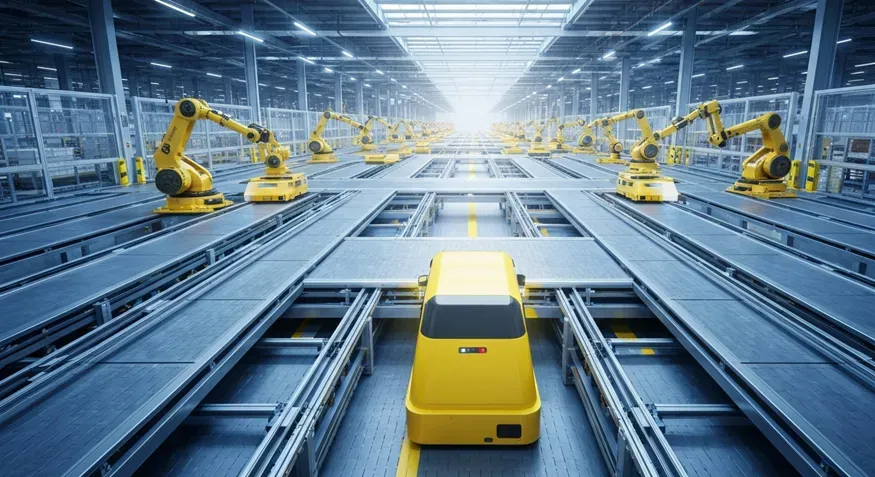What Is A PLC Historian?
What is a PLC Historian?
As technology rapidly advances, traditional methods such as clip boards and transcription of data are becoming a thing of the past. Now is the ideal time to consider upgrading your system for collecting plant performance data in order to stay competitive and benefit from the improved efficiency and cost-effectiveness that modern solutions provide. With the help of advanced Artificial Intelligence algorithms, companies can now easily track, analyze, and optimize their operations in real-time. Advanced
Data Historian software programs are able to capture data from multiple sources quickly and accurately in a matter of milliseconds.

This data is then interpreted and organized in a way that allows for relevant process data to be retrieved in an efficient manner. With this technology, companies have access to large datasets that can be used for various purposes such as analytics, monitoring, or tracking. Historian software is an invaluable tool for businesses of all sizes, from small startups to large enterprises, offering excellent supervision and performance tracking capabilities that ensure quality assurance. It is highly scalable and can be easily adapted from a single machine to an entire enterprise system so that it can accommodate the company’s needs.
The tedious manual task of tracking the immense amount of high-speed data generated from a busy factory can be close to impossible, especially when dealing with large volumes of information. This is why certain businesses have moved to automated solutions that can quickly and accurately manage this data for them. Historian dashboards are the perfect tool to help streamline your workflow and take on the significant task of data analysis, as they provide a reliable and efficient solution that allows you to reduce your workload significantly. They offer a streamlined approach to analyzing vast amounts of data and provide insights which can be used to make informed decisions.
Businesses are now able to make more accurate predictions and forecasts thanks to the reliable data that is made known to them through the use of Artificial Intelligence. AI is able to provide real-time, up-to-date insights and analytics that can help companies make better decisions and prepare for any upcoming changes in their competitive landscape. Clip boards have become a thing of the past, as better technologies have made them obsolete. This development is something that everyone can be thankful for, as it has made life much easier and efficient. Various modern alternatives to clip boards are available in the market today, offering far more features and convenience than their predecessors
Scalable Operational Historian Software Manages Large Data Sets Over Time. Its Data Retrieval System Is Useful for Monitoring and Analyzing Operations.
Historian, an advanced data collection and analysis tool, has been designed to help businesses identify any blind spots in their data collection across the entire enterprise and plant. It provides a comprehensive overview of the business operations, enabling users to track trends, analyze performance, and make informed decisions. The Historian tool helps ensure that all relevant data is collected for deeper insights into the business operations. Additionally, its robust redundancy and high availability features guarantee that access to critical plant information is always available, no matter the circumstances. This ensures that operations remain uninterrupted and the organization's workflow is kept running at full efficiency.
The Historian software platform is a powerful tool for analysis and data management that simplifies the process of converting large volumes of machine data into organized, easily accessible dashboards and reports. The software can be used to quickly generate comprehensive visualizations of complex machine data, helping businesses to analyze trends, track progress over time, identify potential issues before they become problems and much more. These reports come in many forms, containing a variety of descriptive, diagnostic, predictive and prescriptive elements that can be shared among key stakeholders within any manufacturing plant. By leveraging these pieces of information, it is easier for the decision makers to understand complex industrial processes in order to make better informed decisions and enhance the efficiency of their operations.
With the availability of modern advanced archiving technology, businesses are now able to take advantage of long-term data storage and fast data retrieval capabilities. This type of technology is essential for companies that need to store large amounts of data, as it offers them a secure, reliable and cost-effective way to store and access important information whenever they need it. Additionally, this archiving technology also allows businesses to quickly retrieve relevant data when needed. This provides a great opportunity for businesses to optimize their operations in order to remain competitive in today's economy. By utilizing AI writing assistants, organizations can improve their efficiency and productivity while also providing quality content that meets the demands of customers.
A Machine-Level Historian Allows Systems to Store and Analyze Machine Data. This Improves Decision-Making, Uptime, and Costs.
Operational historian software provides businesses with the creative freedom to access detailed production data at the machine level. This allows for a deeper understanding of the operational performance and status of each machine, giving businesses greater insight and control into their production processes. Additionally, this data can be used to quickly identify and address any issues that arise, ensuring a more efficient manufacturing process. The lightweight Historian is a revolutionary piece of equipment designed for machines that can be difficult to access or service. It offers a convenient, cost-effective solution to the problem of maintaining up-to-date records and data of activity logs, allowing machines in hard-to-reach locations to be kept up and running with minimum disruption. By omitting the requirement of a server or personal computer, organizations are able to significantly reduce their chances of suffering losses due to network failure or other types of system obstructions and outages. This helps to ensure that their business operations remain uninterrupted for the most part. Historian, a data storage and analysis platform, can provide a range of tangible benefits to machine builders as they design and develop new solutions.
By allowing for the capture, storage, and retrieval of large amounts of data points over time, it allows machine builders to identify trends more quickly and make more informed decisions when creating new solutions. Furthermore, Historian also provides predictive analytics capabilities which can help engineers anticipate potential issues before they arise. This embedded device is designed with a reliable solid-state backplane, making it an ideal choice for use in industrial machines and other automated systems. It's robust construction provides excellent reliability and performance, ensuring smooth and uninterrupted operation even in the most demanding environments. By automating certain manual processes and providing high-quality content, the implementation of AI writing assistants can drastically improve the productivity of end users. This in turn can help reduce stress and increase job satisfaction while also increasing the overall efficiency of a business.
PLC Historians are specialized software solutions that are commonly used in industrial settings to efficiently store and track data from Programmable Logic Controllers (PLCs). This technology is able to capture and store data in real time, allowing for detailed analysis of the production process. It also provides a comprehensive view of the entire production cycle, enabling effective troubleshooting and optimization. This data, when accurately collected and analyzed, can be used to significantly boost the performance of various processes within the industry. It provides insights that can help companies identify inefficiencies and introduce new strategies to maximize their productivity and reach their goals faster.
Additionally, these Programmable Logic Controllers (PLCs) can be used to store and analyze data that is gathered by the AI writing assistants, allowing for efficient and effective data processing. This information can then be used to gain valuable insights into trends and patterns which can then be used to optimize operations or improve customer service. The stored data in the Historian component of a Programmable Logic Controller (PLC) can be of immense benefit to a variety of use cases. This data can be utilized for predictive maintenance, system optimization, anomaly detection, as well as issuing early warning signals to operators when something is amiss. Furthermore, this data can also be used for trend analysis and forecasting purposes to identify upcoming changes in the system's behavior.
Companies can gain a great deal of value from using PLC historians, as these tools provide a wealth of insights into their operations, giving them the ability to make more informed decisions and improve their processes. By leveraging the data gathered from PLC historians, businesses can gain a better understanding of their operations and be able to identify areas for improvement in order to optimize their performance.



